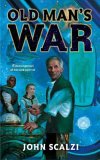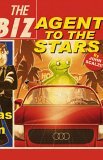2005 was an excellent reading year. In terms of quantity, I got through 45 books, which is more than I have read in a single year in a long time. The quality was good, too, with only four books falling below my standards for “entertaining”. But best of all was the fact that I found three authors who have gone straight on to my list of favourites.
 While we were on holiday in Boston in February, Keith took us to a small SF bookstore in Cambridge (Pandemonium Books), where I bought a copy of John Scalzi‘s novel Old Man’s War. I had been reading Scalzi’s blog for a while, so I knew the book was out and that it had been getting good reviews. I cracked it open while we were still in Boston, and I finished it in about a day. It is fantastic.
While we were on holiday in Boston in February, Keith took us to a small SF bookstore in Cambridge (Pandemonium Books), where I bought a copy of John Scalzi‘s novel Old Man’s War. I had been reading Scalzi’s blog for a while, so I knew the book was out and that it had been getting good reviews. I cracked it open while we were still in Boston, and I finished it in about a day. It is fantastic.
 When Subterranean Press did a special edition of his book Agent To The Stars later in the year, I got a copy of that, too, and it is equally good. These two books are easily the most entertaining science fiction I’ve read since Lois McMaster Bujold’s early Miles Vorkosigan novels. They feature solid ideas, warm characters you can get really involved with, and fast-moving plots. Scalzi’s writing style is simple and perfectly unobtrusive. I never felt like I was wading through lovingly crafted yet unnecessary descriptions, or page count padding. He just gets on with the story. I love these books, and am eagerly awaiting The Ghost Brigades, which is due in February.
When Subterranean Press did a special edition of his book Agent To The Stars later in the year, I got a copy of that, too, and it is equally good. These two books are easily the most entertaining science fiction I’ve read since Lois McMaster Bujold’s early Miles Vorkosigan novels. They feature solid ideas, warm characters you can get really involved with, and fast-moving plots. Scalzi’s writing style is simple and perfectly unobtrusive. I never felt like I was wading through lovingly crafted yet unnecessary descriptions, or page count padding. He just gets on with the story. I love these books, and am eagerly awaiting The Ghost Brigades, which is due in February.
Also while we were in Boston, I read Quite Ugly One Morning by Christopher Brookmyre. Many people had recommended Brookmyre to me, but it took me until this year to read anything by him. I think I’ve made up for that by guzzling down seven of his novels since then. He writes satirical, wickedly anti-establishment thrillers, set mostly in Scotland. (Not The End Of The World takes place in L.A., but features a Scottish protagonist.)
 In his Jack Parlabane series (Quite Ugly One Morning, Country Of The Blind, Boiling A Frog, and Be My Enemy) he takes gleeful aim at corporate greed, political corruption, and religious hypocrisy. The Angelique de Xavia series (A Big Boy Did It And Ran Away, and The Sacred Art Of Stealing) are strongly plotted crime capers, full of twists, black humour, and pop culture references. They are all steeped in Scottish nature, culture, and language. If you’re not Scottish, you might not get all of the jokes–or even understand what some of the characters are saying, fooaltiyeman–but I recommend them very highly nevertheless.
In his Jack Parlabane series (Quite Ugly One Morning, Country Of The Blind, Boiling A Frog, and Be My Enemy) he takes gleeful aim at corporate greed, political corruption, and religious hypocrisy. The Angelique de Xavia series (A Big Boy Did It And Ran Away, and The Sacred Art Of Stealing) are strongly plotted crime capers, full of twists, black humour, and pop culture references. They are all steeped in Scottish nature, culture, and language. If you’re not Scottish, you might not get all of the jokes–or even understand what some of the characters are saying, fooaltiyeman–but I recommend them very highly nevertheless.
 Last up is Neal Asher, whom I had the pleasure of interviewing via email back in June. Neal Asher is an “action movie” kind of storyteller. Situations are Desperate, Heroes are Tough, and Stuff goes Boom. A lot. My favourite books of his are the Ian Cormac series (Gridlinked, The Line Of Polity, and Brass Man), a set of stories about a secret agent dealing with psychotic criminals and cryptic alien entities in a far-future setting. You want tense SF thrillers? Look no further.
Last up is Neal Asher, whom I had the pleasure of interviewing via email back in June. Neal Asher is an “action movie” kind of storyteller. Situations are Desperate, Heroes are Tough, and Stuff goes Boom. A lot. My favourite books of his are the Ian Cormac series (Gridlinked, The Line Of Polity, and Brass Man), a set of stories about a secret agent dealing with psychotic criminals and cryptic alien entities in a far-future setting. You want tense SF thrillers? Look no further.
But those aren’t all the books I enjoyed in 2005. Also of particular note were Market Forces by Richard Morgan, the Coyote books (Coyote and Coyote Rising) by Allen Steele, the Hammered series (Hammered, Scardown, and Worldwired, which I have yet to read) by Elizabeth Bear, and two Prey books (Hidden Prey and Broken Prey by John Sandford. I keep reading stuff by Charlie Stross, and I keep wanting to like it…but it the books of his I’ve read this year (Singularity Sky, Iron Sunrise, and Accelerando) have just failed to set me alight. I think I’ll try his Hidden Family series next. With a little less emphasis on the hard science, he might be writing characters I would find more interesting.
How cool that you got to interview Neal Asher! I have loved the two or three books that I have read by him. They are enthrawling books for sure! If you are looking to build a list for the new year, I have a new book to recommend to you.
The book is titled “The Fall of Lucifer”, written by Wendy Alec.
The book opens with the three Angelic brothers, Lucifer, Michael and Gabriel, in heaven before the fall. Over the course of the book, the essence of the angels is developed. The controversy arises when God created man to be higher than the angels, in that we are created in the image of God. Lucifer was embittered to the point of rebellion.
Various historical events are incorporated, and the plot offers the perspective of an angel into the events. The novel develops the beauty of heaven and the grotesque quality of hell, the depths of evil, and the beauty of grace. It communicates these themes through beautiful imagery and an intriguing plot. The beautiful imagery would make for amazing scenery!
This is a fast read, 300-page novel that is consuming to the imagination and penetrating to the heart. I hope they make this book into a movie. It would be amazing. If you have time, I hope you enjoy it!
Thanks, Lin. I’ll see if I can find it.
Thanks Martin – nice list to be on.